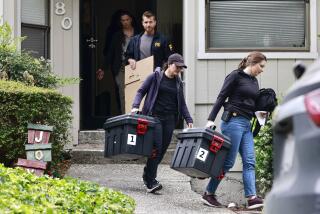Hostage, Now Home, Tells of Death Threats
- Share via
FULLERTON — Randall N. Trinh, a U.S citizen held hostage as a human shield at an Iraqi factory until his release two days ago, said Monday that he lived through an even more terrifying ordeal in Kuwait immediately after the Iraqi invasion.
In an interview with reporters at his daughter’s apartment here after his arrival at Los Angeles International Airport, Trinh said his life was repeatedly threatened by Iraqi military authorities looking for American and British citizens.
Trinh is a 49-year-old structural engineer and naturalized U.S citizen who had been working in Kuwait for the Santa Fe International Corp. when Iraq invaded that country. Trinh said he was able to fool authorities into believing that he was a Vietnamese citizen who had lost his passport.
He moved fairly freely about the city, he said, shopping and running errands for others in the compound.
“When the Iraqis came to the door, they asked if there were any Americans there, and they said: ‘If you are lying, we will kill you,’ Trinh said. “Kuwait was terrifying, but Baghdad was not so bad.”
Trinh said his sense of unease while still in Kuwait was heightened as he grew ill with a peptic ulcer. He soon ran out of medicine, he said, but was too fearful to seek treatment at a hospital.
He said he left his apartment in Kuwait City on Aug. 10 and traveled to Baghdad after Iraqi authorities assured foreigners that they would be given safe passage out of Kuwait. Once in Baghdad, however, he and other American citizens were denied exit from Iraq and were taken to the Al Mansur Hotel.
Trinh said he was treated well at the hotel. “It was very nice, I had no complaints, and the food was great.”
Iraqi authorities became concerned with his health, and Trinh said he saw at least six specialists who diagnosed his ulcer and gave him medication.
However, the situation again became tense for him when he was moved early last week to a factory as part of Iraq’s practice of keeping foreigners at strategic sites to discourage attacks by Western forces. He said he thinks that the factory, about 62 miles north of Baghdad, was involved in making explosives or chemical weapons.
Trinh said conditions at the installation were poor and the food was meager, only bread and eggs. When his ulcer flared up again, he said, he was moved to a hospital. A New York-based group, Fellowship of Reconciliation, was then able to secure his release and that of three other Americans.
Trinh was greeted privately in a U.S. Customs’ waiting room in Los Angeles by his wife, Kim Yen Trinh, and their two daughters, Christy, 23, and Suzie, 21.
Weary from the long trip home, he declined to speak to the crush of reporters awaiting his arrival. He was whisked out a VIP entrance by airport security personnel.
Kim Trinh said before her husband arrived Monday that the family had planned a big fish dinner to celebrate his return home.
“That is one of his favorite meals, and I’ve been working to prepare it all day,” she said. “I think he will enjoy this, and we’re just going to relax and have a good time.”
Trinh, who immigrated to America with his family in 1975 just before the fall of Saigon, said he is ready to make a new start once again.
“I’m very, very lucky to be released,” he said. “I’m going to take a few days off, get a check-up and then start looking for a new job.”
Trinh said his health has improved “50%” in the short time since his release. “I feel so much better now that I’m out.”
But he said he regrets that all of the hostages were not released along with him.
“There are still many there, and I wish they were all out.”
Trinh said his Iraqi escort gave him instructions just before his release. “He said: ‘Talk to people and try not to make war.’ ”
Christy Trinh, who was graduated from UCLA in June, said her father will probably spend a lot of his spare time “playing with the computer,” one of his passions.
She said Iraqi military authorities confiscated Trinh’s computer from his apartment in Kuwait after the invasion.
More to Read
Sign up for Essential California
The most important California stories and recommendations in your inbox every morning.
You may occasionally receive promotional content from the Los Angeles Times.














